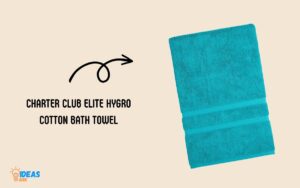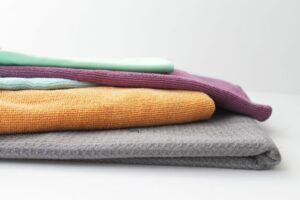Should Bath Towels Be Washed in Hot Water? Yes!
Yes, bath towels should be washed in hot water. Hot water is effective in killing bacteria and germs that can accumulate on towels, making it the most sanitary option for washing.
Bath towels often harbor bacteria and other microbes due to the moisture and warmth they provide, hence making them the perfect breeding grounds for these microorganisms.
Constant use of these towels can lead to the buildup of dirt, oils, and dead skin cells. Hot water helps to thoroughly cleanse and sanitize towels, ensuring they are clean and safe for use.
Hot water washing is crucial for maintaining the cleanliness of your bath towels. Not only does it effectively kill bacteria, but it also helps remove dirt and grime that can build up over time.
By opting for a high-temperature wash, you’re ensuring your towels are as clean as possible and prolonging their lifespan.

Key Takeaway
Why Hot Water Might Be Necessary For Towel Cleaning?
Cleaning bath towels in hot water is necessary for several reasons. Firstly, hot water helps to kill bacteria and germs that may be present on the towels.
Additionally, hot water aids in effectively removing dirt, oils, and sweat, leaving your towels fresh and clean.
When it comes to keeping our bath towels clean and fresh, using the right water temperature is crucial. Hot water offers a range of benefits that contribute to effectively cleaning and maintaining towels.
We will explore why hot water might be necessary for towel cleaning, focusing on its effectiveness in killing bacteria, removing stains and odors, as well as its overall benefits for deep cleaning.
Effectiveness Of Hot Water In Killing Bacteria:
- Hot water serves as a powerful ally in killing bacteria that may accumulate on our bath towels.
- High temperatures above 140°F (60°C) effectively eliminate potentially harmful bacteria and germs.
- The heat produced by hot water helps sanitize the fabric and ensures a hygienic towel for each use.
Removing Stains And Odors With Hot Water:
- Hot water aids in breaking down stains, making it easier to remove them from the towel’s fibers.
- By dissolving and loosening the particles causing the stain, hot water enhances the effectiveness of detergents.
- The heat also helps eliminate unpleasant odors that may cling to the towel, providing a fresher and more enjoyable post-shower experience.
The Benefits Of Hot Water For Deep Cleaning:
- Hot water facilitates a deeper cleaning process, reaching deeper into the fabric’s fibers.
- The heat helps to loosen dirt, grime, and oils that may accumulate over time, resulting in a more thorough cleaning.
- Deep cleaning with hot water prolongs the lifespan of towels by maintaining their absorbency, softness, and overall quality.
Using hot water for washing bath towels proves highly beneficial. Its effectiveness in killing bacteria, tackling stains and odors, and promoting deep cleaning ensures that your towels remain fresh and hygienic.
By incorporating hot water into your towel cleaning routine, you’ll enjoy the comfort and cleanliness of these essential bathroom essentials.
Potential Disadvantages Of Washing Towels In Hot Water
Washing bath towels in hot water can have potential disadvantages. High temperatures may cause shrinkage, color fading, and damage to the fabric, reducing the towel’s lifespan. It is advisable to consider these drawbacks before deciding on the washing temperature.
Washing our bath towels is a routine chore that we often perform without much thought. However, have you ever stopped to consider the potential disadvantages of washing towels in hot water?
Here, we explore a few drawbacks that may make you reconsider your washing routine.
Impact On Towel Color And Fabric Quality
- Hot water can cause colors to fade: Exposing towels to hot water for prolonged periods can lead to color fading. This is particularly noticeable in vibrant or dark-colored towels, as the heat can break down the dye molecules, resulting in a dull and faded appearance.
- Risk of color bleeding: Washing towels in hot water increases the likelihood of color bleeding. If you have towels in different colors, there is a possibility that the darker colors may bleed onto the lighter ones, leading to unsightly stains that can be difficult to remove.
- Fabric damage and wear: High temperatures can weaken the fabric of your towels over time. The constant exposure to hot water can break down the fibers, causing them to lose their softness and absorbency. This can result in rough and scratchy towels that are less pleasant to use.
High Energy Consumption Of Hot Water Washing
Increased energy bills
Heating water for laundry purposes consumes a considerable amount of energy, and using hot water for every towel wash can significantly contribute to your energy bills.
By reducing the frequency of hot water washing or opting for colder washes when possible, you can save both energy and money.
Environmental impact
Heating water for washing towels contributes to your carbon footprint. The energy required to heat water produces greenhouse gas emissions.
By reducing hot water usage, you can help minimize your environmental impact and contribute to a more sustainable future.
Can Hot Water Damage Delicate Towels?
Delicate fabric vulnerability
Delicate towels, such as those made from bamboo or with intricate patterns, are more susceptible to damage from hot water.
The heat can cause the fibers to shrink or warp, compromising the towel’s integrity and aesthetic appeal.
Premature wear and tear
Hot water can accelerate the wear and tear process for delicate towels, shortening their lifespan. If you’ve invested in luxurious or specialty towels, it’s best to follow care instructions and avoid subjecting them to excessive heat.
By considering these potential disadvantages of washing towels in hot water, you can make informed decisions about your laundering routine.
While hot water may be beneficial for removing stubborn stains and sanitizing certain items, it’s important to weigh the trade-offs and adjust your practices accordingly.
As with any decision, experimenting with different temperatures and taking care of your towels can help ensure they remain in optimal condition for longer.
Finding The Right Balance: Tips For Washing Towels
Bath towels can be washed in hot water for a thorough clean, but it’s important to find the right balance.
Hot water can help remove bacteria and stains, but it can also cause towels to fade and lose their softness. It’s recommended to wash towels in warm water to maintain their quality and longevity.
We’ll explore the different factors to consider when washing towels and provide some tips to help you find the right balance.
Adjusting Water Temperature Based On Towel Type:
- Cotton towels: Cotton bath towels are the most common type and can withstand high temperatures. Washing them in hot water (around 140°F or 60°C) can effectively remove dirt, oils, and bacteria.
- Microfiber towels: Microfiber towels are known for their absorbency and quick drying properties. To maintain their effectiveness, it’s best to wash them in warm water (around 100°F or 40°C) as hot water can damage the fibers.
- Delicate towels: Delicate towels, such as those made from bamboo or linen, require extra care. It’s recommended to wash them in cold water (around 80°F or 30°C) to prevent shrinkage or damage to the fabric.
Using Hot Water Intermittently For Disinfection:
- Occasionally, you may want to disinfect your towels by using hot water. This is particularly useful if someone in your household is sick or if you want to eliminate any lingering germs. Simply washing your towels in hot water (around 140°F or 60°C) for one cycle can help kill off bacteria and viruses.
- However, it’s important to note that using hot water for every wash can shorten the lifespan of your towels and cause them to lose their softness.
Alternatives To Hot Water Washing For Delicate Towels:
If you have delicate towels that require cold water washing, there are alternative methods to ensure they are properly cleaned:
- Pre-soaking: Soak your towels in a mixture of cold water and gentle detergent before washing. This will help loosen dirt and stains.
- Gentle cycle: Use the gentle cycle on your washing machine to minimize agitation and prevent damage to the fabric.
- Use a laundry bag: Place your delicate towels in a mesh laundry bag before washing. This will provide an extra layer of protection.
Finding the right balance when washing towels is crucial for maintaining their quality and longevity. Whether you’re adjusting water temperature based on towel type, using hot water intermittently for disinfection, or exploring alternatives for delicate towels, these tips will ensure that your bath towels stay clean, fresh, and ready for use.
Understanding Bacterial Contamination In Towels
One may wonder if bath towels should be washed in hot water due to the potential bacterial contamination they carry.
Understanding the importance of proper laundering techniques is crucial for maintaining hygiene and preventing the spread of harmful bacteria.
How bacteria thrive in damp towels:
- Dampness creates a favorable environment for bacteria growth.
- Moisture enables bacteria to multiply rapidly.
- Humidity in towels provides an ideal breeding ground for various types of bacteria.
- Bacteria flourish in the warm and damp conditions, increasing the risk of contamination.
Health risks associated with bacterial contamination:
- Bacterial contamination in towels can lead to infections and illnesses.
- Harmful bacteria such as E. Coli and Staphylococcus aureus may be present.
- Coming into contact with these bacteria can cause skin infections or respiratory issues.
- If used on the face or body, contaminated towels can transfer bacteria to vulnerable areas, potentially causing infections or inflammation.
The role of hot water in killing bacteria:
- Hot water is generally effective in killing bacteria due to its high temperature.
- Raising water temperature to around 140°F (60°C) or above can eliminate most bacteria.
- Hot water can destroy both gram-positive and gram-negative bacteria.
- Heat disrupts the structure and function of bacteria, leading to their destruction.
Understanding the role of bacterial contamination in towels is crucial for maintaining good hygiene. Proper laundering techniques, including washing towels in hot water, can help eliminate harmful bacteria.
By keeping towels clean and preventing bacterial growth, we can reduce the risk of infections and promote a healthier environment.
Examining The Effects Of Temperature On Stain Removal
Discover the impact of temperature on stain removal and whether washing bath towels in hot water is necessary.
Explore the potential benefits and drawbacks to make an informed decision about the best temperature for keeping your towels clean and fresh.
How Hot Water Helps Break Down Stains
- Hot water is effective in breaking down stains because it helps to dissolve and dislodge particles that are trapped within the fabric of the towel.
- The high temperature of the water can help to loosen and remove oils, dirt, and other substances that may be causing the stain.
- Hot water also increases the speed of chemical reactions, making it more effective in breaking down and removing stains.
The Impact Of Different Temperatures On Stain Removal
- Different temperatures of water can have varying effects on stain removal, depending on the type of stain and the fabric of the towel.
- Hot water is most effective in removing oily stains, as it can break down the oils and help them to lift from the fabric more easily.
- Warm water is generally effective in removing most stains, as it can help to break down and dissolve the particles causing the stain.
- Cold water is best for preventing the setting of protein-based stains, such as blood or sweat, as hot water can cause these stains to set and become more difficult to remove.
Considerations For Different Types Of Stains
- Oily stains: Hot water is most effective in removing oily stains, as it can break down the oils and make them easier to remove. Apply a pre-treatment stain remover for better results.
- Protein-based stains: Cold water is recommended for protein-based stains like blood or sweat as it prevents the stain from setting. Pre-soaking the towel before washing can also help to loosen the stain.
- Color stains: Hot or warm water may cause color stains to set or bleed, so it’s best to use cold water or follow the care instructions on the towel.
- Dye stains: Hot water is generally effective in removing dye stains, but it’s important to check the care instructions on the towel. If unsure, test a small, inconspicuous area of the towel first.
- General stains: Warm water is typically effective in removing most general stains, as it can help to break down and dissolve the particles causing the stain.
Remember, always check the care label on your towel for specific instructions on water temperature and stain removal.
Preserving Towel Quality And Longevity
Washing bath towels in hot water can shorten their lifespan and affect their quality. Opt for warm or cold water to preserve their longevity and keep them in good condition for longer.
Washing towels in hot water may seem like a surefire way to eliminate germs and get them squeaky clean.
However, hot water can have significant effects on the fibers of your towels. So, is hot water really the best choice for maintaining towel quality and longevity?
Let’s explore the impact of hot water on towel fibers, as well as alternative methods and practical tips to extend your towels’ lifespan.
The Effects Of Hot Water On Towel Fibers
Hot water can have both positive and negative effects on towel fibers. It’s important to understand these effects to make an informed decision about how to wash your towels effectively.
- Opens up the fibers: Hot water opens up the towel fibers, allowing detergents to penetrate deeply and effectively remove dirt and grime.
- Fading and color loss: However, hot water can cause colors to fade faster, resulting in a dull and lifeless appearance.
- Weakened fibers: The excessive heat from hot water weakens the towel fibers over time, leading to fraying, thinning, and a shorter lifespan.
- Shrinkage: Hot water can cause towels to shrink, especially if they are made from natural fibers like cotton.
Alternatives To Hot Water For Maintaining Towel Quality
If you are concerned about the potential damage hot water can inflict on your towels, there are several alternatives you can consider.
- Warm water: Washing towels in warm water (around 90°F or 32°C) strikes a balance between effective cleaning and minimizing fiber damage.
- Cold water: Cold water can be gentle on towel fibers, reducing the risk of fading, shrinkage, and weakening. However, it may not eliminate germs as effectively as hot water.
- Pre-soaking: To tackle stubborn stains and deeply embedded dirt, consider pre-soaking your towels in a stain-removing solution or using an enzyme-based laundry detergent.
- Gentle cycle: Opt for the gentle or delicate cycle when washing towels. This cycle reduces agitation and helps preserve the integrity of the fibers.
Tips For Extending The Lifespan Of Towels
To ensure your towels remain in top-notch condition for as long as possible, follow these simple yet effective tips:
- Separate colors: As colors can bleed in the wash, it is advisable to separate light-colored towels from dark-colored ones to prevent color transfer and maintain their vibrancy.
- Avoid fabric softeners: Fabric softeners can leave a residue on towels, making them less absorbent over time. Instead, opt for vinegar as a natural fabric softener alternative.
- Air drying: Whenever possible, air dry your towels instead of using a dryer. High heat can weaken the fibers and contribute to shrinkage.
- Avoid overloading the washing machine: Overloading can prevent proper cleaning and rinsing, leading to less effective removal of dirt and detergent residue.
- Use mild detergents: Harsh detergents can strip away the natural oils in towel fibers, making them less soft and more prone to damage. Opt for mild, eco-friendly detergents instead.
By understanding the effects of hot water on towel fibers, exploring alternative washing methods, and implementing practical tips for towel care, you can preserve towel quality and longevity.
Remember, maintaining the integrity of your towels not only ensures they look and feel great but also saves you money in the long run by reducing the need for frequent towel replacements.
Proper Washing Techniques For Maximum Cleanliness
For maximum cleanliness, it is important to wash bath towels in hot water. This ensures proper sanitization and effectively removes dirt and bacteria. Regularly washing towels in hot water helps maintain hygiene and enhances their longevity.
Sorting towels by color and fabric type:
- Sort your bath towels by color and fabric type to ensure that you’re washing like items together. This prevents any potential color bleeding and helps maintain the quality of your towels.
- Separate white towels from colored ones to prevent color transfer.
- If you have towels made from delicate fabrics like bamboo or microfiber, wash them separately from the heavier cotton towels. This helps to avoid any damage caused by rougher fabrics.
Pre-treating stains before washing:
- Before tossing your towels into the washing machine, it’s a good idea to pre-treat any stains.
- Dampen the stained area with water and apply a small amount of stain remover or liquid detergent directly to the affected spot. Gently rub the fabric together to work in the product.
- Let the pre-treatment sit for a few minutes to allow it to penetrate the stain before washing as usual.
Using the appropriate amount of detergent:
- It’s important to use the right amount of detergent when washing your bath towels. Too little may not effectively clean your towels, while too much can leave behind residue that can affect their absorbency.
- Follow the manufacturer’s instructions on the detergent bottle for the recommended amount to use based on the load size.
- Generally, half to three-quarters of the designated cap is enough for a regular-sized load of towels.
By following these proper washing techniques, you can ensure that your bath towels are clean, fresh, and long-lasting.
Remember to sort towels by color and fabric type, pre-treat stains, and use the appropriate amount of detergent for maximum cleanliness. With these tips, your towels will continue to provide you with a soft and luxurious bathing experience.
Energy Efficiency And Environmental Impact
Washing bath towels in hot water may not be necessary as they can be just as clean when washed with cold water.
This small change can contribute to energy efficiency and reduce the environmental impact of hot water usage.
Bath towels are an essential part of our daily lives, and ensuring they are clean and fresh is important for hygiene and comfort. But have you ever wondered if washing your bath towels in hot water is necessary?
We will delve into the energy efficiency and environmental impact of hot water washing, as well as explore alternative temperature settings for reduced energy consumption.
We will also discuss environmentally-friendly laundry practices and their benefits. So, let’s jump right in!
Exploring The Energy Usage Of Hot Water Washing:
- Hot water washing of bath towels utilizes a significant amount of energy due to the energy required to heat the water.
- The water needs to reach a high temperature to effectively remove dirt, bacteria, and odors from the towels.
- Heating water accounts for a significant portion of home energy consumption, contributing to increased electricity or gas usage.
Alternative Temperature Settings For Reduced Energy Consumption:
- Using warm or cold water for washing bath towels can help conserve energy and reduce utility bills.
- Warm water, typically around 90°F (32°C), is effective in removing everyday dirt and stains while requiring less energy compared to hot water.
- Cold water, around 60°F (15°C) or below, may not be as effective in removing tough stains but is suitable for regular laundering of lightly soiled bath towels.
Environmentally-Friendly Laundry Practices:
- Opting for a front-loading washing machine instead of a top-loading one can reduce water and energy consumption.
- Washing full loads of bath towels saves water and energy, as running partial loads wastes resources.
- Using eco-friendly laundry detergents without harsh chemicals not only reduces environmental impact but also prolongs the life of your bath towels.
- Air drying bath towels instead of using a dryer eliminates energy consumption and helps maintain towel freshness.
By considering these alternative temperature settings and adopting environmentally-friendly laundry practices, you can contribute to energy efficiency and reduce the environmental impact associated with hot water washing.
Start making small changes today and enjoy clean, fresh bath towels while saving energy and protecting our planet.
Conclusion
The temperature at which you wash your bath towels can have a significant impact on their cleanliness and longevity. While hot water is effective at killing bacteria and germs, it may also cause colors to fade and fibers to wear out more quickly.
On the other hand, washing in cold water may not eliminate bacteria as effectively, but it helps to preserve the towel’s integrity.
Ultimately, the decision of whether to use hot or cold water depends on your personal preferences and the condition of your towels.
Additionally, it is important to use a high-quality detergent and follow the care instructions provided by the manufacturer.
Regular washing, regardless of the water temperature, along with proper drying and storage, will help to maintain your bath towels in the best possible condition, ensuring their continued softness and absorbency for years to come.






